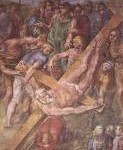Sixth Sunday of Easter – Cycle A
Reflecting on 1Peter 3:15-18
Always be ready to give an explanation to anyone who asks you for a reason for your hope.
Isn’t that beautiful? The author of the second reading today is talking to the earliest converts to the faith, urging them to have a good reason on hand for why they are hopeful in their terrifying first-century world.
I like to think about those earliest Christians. According to tradition, every single one of the apostles listed in the Gospels (except for Judas) experienced torture, and most of them martyrdom, because of their hope in Christ. They “took on Christ” during the most violent years of the Roman Empire. They faced up to Nero and Trajan and Domitian, and often converted their own jailers, who went to their deaths with them.
I recently saw the shatteringly beautiful movie Of Gods and Men. It tells the true story of eight Cistercian monks who chose to stay with their Muslim friends in a besieged Algerian village in 1997. Two eyewitnesses who survived recorded their memories of the agonizing community meetings that took place before the abduction and murder of the other members.
Why did they stay when they knew their lives were in imminent danger? We know from the survivors that the love of Christ compelled them. Their love for their neighbors, whom they doctored, and cared for, and worked side by side with, gave them the strength to face their radical Islamist assassins when they came for them one dark and freezing night.
The Christ who called them to Himself was the reason for their hope. And hope does not disappoint.
What would YOU like to say about this question, or today’s readings, or any of the columns from the past year? The sacred conversations are setting a Pentecost fire! Register here today and join the conversation.
I have come to light a fire on the earth; how I wish it were already burning (Lk.12:49).


I think that the torture Judas suffered was far worse than that faced by the other apostles. Judas’ despair — the loss of hope — in the salvation through Jesus Christ was internal torture imposed on himself. Could there ever be worse torture? The other apostles clung to the hope in the salvation of Christ and endured the torture of their bodies, which left their souls untouched. As difficult as their torture may have been to endure, their hope in Christ for eternal life gave them the realization that this torture was limited to what it could do to their bodies. Their souls — the only part of humans that matters eternally — could not be touched by their torturers.
We ‘take on Christ’, in the use of our charisms. These become the reason for our hope, as we see folks/even strangers, around us encounter Christ in us through our God given charisms. These experiences, then, become the reason for others’ hope as well.
Brevis has a profound insight here. When one suffers and one’s heart is aligned with the purpose, the suffering becomes “survivable” – for want of a better term. But when one is internally conflicted, the torture does not seem to accept of an ounce of mitigation. Thanks for opening my eyes, Brevis. – – Cris
Being a very young Catholic, and growing up completely after Vatican 2, I believe that this reading is always very problematic for us new generation of Catholics. I believe that there is a tendency to read the first part of this reading, “Always be ready to give an explanation to anyone who asks you for a reason for your hope”, without reading the second “But do it with gentleness and reverence”. I know that I have a tendency to use my explanation for my joy to smash over peoples heads. And condemn them in the the name of Orthodoxy. But that is not the Love of Christ, and it takes prudence to discern what that love is. Furthermore, I believe that it takes a deep relationship with Christ in order to be able to know that love, and be able have that joy that you need an explanation for.
Just some musings. ~Ryan
Thanks for your comment, Cris!
Ryan,
I am way older than you, but I am a post-Vatican II convert to Catholicism. I think it’s not in what we say, but always in how we say it. We can gently and firmly stand up for the faith and express our hope in a joy-filled way without condemning others. It’s not easy sometimes, though, I’ll give you that.
As a parent, I look back and wish I had done less talking and asked more questions. Perhaps, we should do that as Catholics, too. In asking questions, we can lead good discussions of the reasons for our hope, and it’s always good to know what the other person believes before relating it to what we believe.
The fact that you recognize the “smashing over people’s heads” is the best step you can take in the right direction. Congratulatlions!
Ryan,
What a great point you make…about smashing people over the head. Even as a timid Catholic at times, I have been smashed over the head by other Catholics who feel they are much closer to God than I! And by their use of the “smash” method instead of the gentleness and example of our Lord, I have backed away rather than challenged that behavior. Then I think of how a nonCatholic responds to such behavior, and I think it drives them away and causes them to spread bad words about us Catholics. It reminds me of St. Francis’ lesson, “Preach the gospel, and when necessary, use words.” Thanks for the insight into that specific phrase!